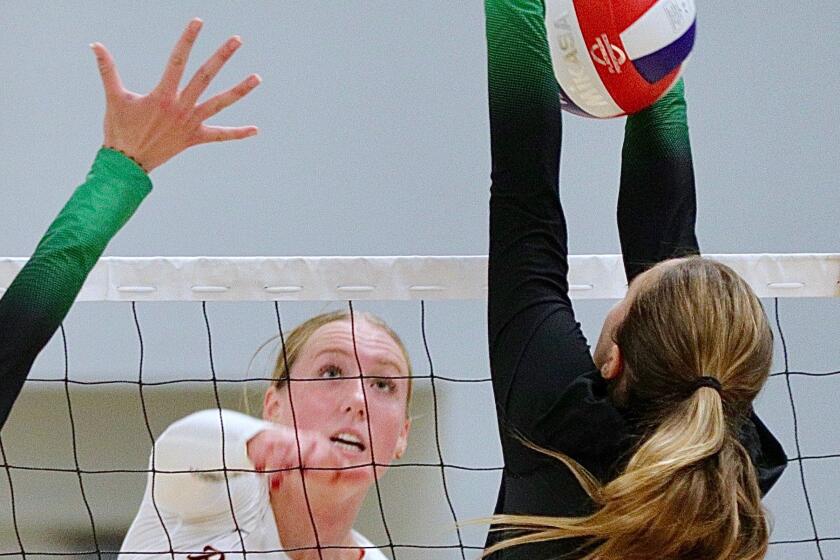COMMENTARY : Athletics and Politics Do Not Mix
Marco Lokar is back in Italy, and the college campus is once again made safe from dissent.
For those who hadn’t followed his story, Lokar was, until recently, a college basketball player at Seton Hall. But when Seton Hall, along with virtually every other college across the land, decided to sew American flag patches onto its athletes’ uniforms, Lokar declined. Seton Hall officials said that was fine, that it was his choice. The last thing they wanted was to pressure anyone.
But many people who come to watch Seton Hall play apparently disagreed. Many of them didn’t like it that one player, and only one player, on the floor wasn’t proudly displaying the flag. They booed Lokar whenever he touched the ball. Some people kindly suggested he return to his native Italy. Love it or leave it, remember? And his pregnant wife actually received death threats.
He didn’t wear the flag, Lokar would explain, because he is against war -- all wars -- and he felt that wearing the flag symbolized approval of the conflict in the gulf. And now, because he was against the war, he has been hounded into quitting the team and going home.
This is not a proud moment in American history.
The meaning of the flag is probably too deep a subject for this part of the newspaper, but I’m pretty sure that in my high school civics class we were taught the freedom to disagree was pretty fundamental to the idea of America.
But there’s even a simpler lesson to be learned here, and it’s just this: that sports and politics do not mix.
When construction workers head off to the job, they don’t have flags sewn into their shirts. Neither do doctors or accountants or teachers or sports writers. They’re not unpatriotic, are they, if they decide not to make a public display of their feelings on war? In fact, nobody asks them to.
So what’s different about athletes?
Everything, apparently. At the World Series, the flag was sewn into the players’ uniforms. At the Super Bowl, the flag was stuck onto the players’ helmets. In the NBA, the flag is on every player’s warmup. And at virtually every ESPN-televised college basketball game, the players have the flags sewn into their uniforms.
Why does anyone see a connection between sports and war? Is it because generals talk like coaches and coaches talk like generals? Or it just because in both cases uniforms are required. Topps has actually come out with Persian Gulf war cards, suitable for trading. Imagine.
Of course, there’s nothing wrong, per se, with a flag on a uniform, any more than there is something wrong with wearing a flag pin on your lapel. It’s a statement of a kind, and in a war where we’re helpless to do anything more constructive than watch it proceed on TV, it makes many of us feel as if we’re contributing. And if a college basketball player felt that he wanted to make that kind of statement and sew a flag on his uniform, what would be so wrong? At least, it would suggest that the student had considered his actions, that he had thought about war and death and sacrifice. It might mean he or she had a loved one at risk. It might mean that he or she cares for all people at risk.
But that’s altogether different from colleges mandating that players wear flags. When a college mandates that players wear a flag, it is suggesting that there is no other reasonable, and patriotic, response to war.
And it takes a brave person to stand alone when declining to wear the enduring symbol of our country while performing in front of thousands. It’s a decision the college athlete, who is already overburdened, should not be asked to make.
To take it a step further, what if the athlete decided to take a stand against war and wanted a peace sign sewn onto the uniform? Would he or she be allowed to? Should he or she be allowed to?
If the answer is no, it’s because the basketball court is not a place to make political statements. It’s a place to play basketball. It isn’t a forum to determine the relative merits of war. Neither is it a place to determine the limits of dissent. It’s where games are played.
Besides, when everyone decides at once -- there are a few exceptions, Princeton being notable among them -- for players to display a flag patch, it cheapens the entire process. Could anyone have actually thought this through? It looks like a blind rush to see who could support a thus-far popular war the most loudly. And for the schools who came in late, it was a rush to show that they were as patriotic as the next school.
You think they routinely sew flags onto costumes at the school play? Of course not. The irony here is that the college campus is the last place where mindless conformity should be encouraged. The college campus is a place where ideas are to be challenged, where students are taught to examine all sides of an issue.
It would figure that those who administer college athletics would get it wrong, and that the college presidents, as usual, are along for the ride. It’s just one more piece of evidence that the typical college athletic department is only dimly connected to rest of the campus.
More to Read
Go beyond the scoreboard
Get the latest on L.A.'s teams in the daily Sports Report newsletter.
You may occasionally receive promotional content from the Los Angeles Times.










